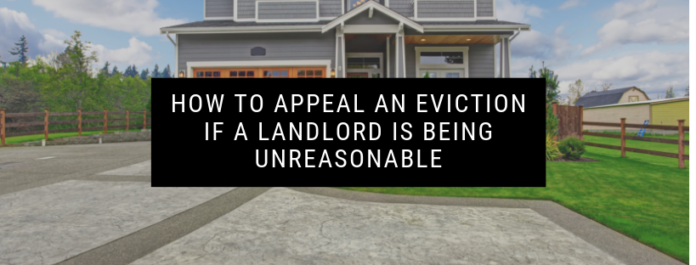America is facing a housing crisis. Studies conducted in 2017 labeled nearly half of all renters as “rent-burdened,” meaning they spend more than 30 percent of their income on rent.
In fact, 2.3 million people are evicted from their homes annually according to a January 25 report by American University. At the same time, studies are revealing not all evictions are created equal. Some landlords commit serial eviction, when they evict tenants repeatedly, contributing to the ongoing housing crisis in the United States.
If you believe you’ve been wrongly evicted, you have options. If you’re the victim of landlord harassment or just believe your landlord has committed an illegal eviction, then you have a leg to stand on.
Read on to learn more about how to appeal an eviction and keep the home you’re living in.
Were You Evicted Legally?
Before you have to appeal the eviction, you’d do well to do whatever you need to do to avoid eviction. When your landlord puts you out on the street, your reputation as an evictee follows you. Future landlords have the option of not renting to you because of past evictions.
With that said, sometimes you cannot avoid an eviction, especially if you have an awful landlord.
To sustain a proper eviction, a landlord should fill out the proper, legal paperwork. If your landlord shows up at your door and says, “You’re out!” without paperwork, do not leave. A legal eviction usually involves legal authorities, such as law enforcement officers, who come to your door and serve your papers.
If your landlord serves your papers that state you are being evicted for failure to pay your rent, then do whatever you need to do to pay your rent. From the day you receive your notice, you have five days to get caught up on your rent.
Pay your rent to the county clerk who is handling your case if your landlord will not take it.
If you cannot pay your landlord has filed the proper paperwork and service you an eviction notice, and then you’re evicted, you have another option: appeals.
What is an Appeal?
Remember, an eviction appeal means the case has gone through the court already. Your eviction happened. However, you believe that someone did not follow the letter of the law, and you want another judge to consider your case.
So you appeal it.
The second judge will start examining the case and consider if the previous judge made any errors of the law.
Two different courts could hear your case: the District Court appellate division which is made up of District Court Judges who hold hearings in courthouses around the state, or the Appeals Court. The Appeals Court typically resides in one particular city in your state.
The Basic Steps for How to Appeal an Eviction
Eviction appeals take time and money, but if you follow the right steps, you have a higher chance of finding yourself on the right side of the case.
1. You lose your initial case and are evicted.
This obviously has to happen for you to appeal the eviction in the first place. Make sure, as mentioned above, your landlord filed legal paperwork for eviction. He cannot just tell you to leave.
At this point, you have five days to leave the premises if you do not appeal your case.
2. Hire an attorney.
Eviction procedures are legal proceedings. Do not attempt to represent yourself in court. Hire an attorney, even if just to prepare the proper paperwork.
For appeals, in particular, you need an attorney’s knowledge to navigate the legal process. Obtain legal representation if you’ve not done so already to help with understanding the rules of the appellate court
3. File paperwork.
Prepare a brief, or have your attorney prepare a brief with reasons why the lower court was wrong or what mistakes the lower court made. This brief will be between 40 and 50 pages long.
Be aware that you need to file this paperwork quickly. For some states, you have only five days from the time the judge made his initial decision. In other states, you have up to ten days.
With other cases, you have thirty days to appeal. Eviction cases are different. You have limited time to make your appeal, so do it immediately. This is also why you need an attorney.
If you miss the deadline, your landlord can get a Write of Possession, an order that will have you and your belongings moved out. You know those pictures you see on the internet of people’s personal possessions on the lawn? That could be you if you miss this deadline.
4. Prepare and Make Oral Arguments
Sometimes you have the opportunity to make an oral argument. You go before the appellate judges and state the reasons why the lower court was wrong. Basically, you have the chance to say aloud what your brief is saying in writing.
5. Appellate Court Written Decision
Once you and your landlord have made your case, the appellate court judge makes a ruling stating whether he or she disagrees or agrees with the original ruling. That’s the end of your case.
Eviction Appeals Details
Appealing an eviction will cost you money. To start off with, you should expect to pay around $75 for the eviction appeal notice, depending on what state you live in.
Also, you file your appeal, you also must pay the cost bond. This will cost you around $250 depending on the state and will cover the court costs incurred by the landlord in defending the appeal.
If you absolutely cannot afford a lawyer, which would make sense considering you may not be able to afford rent, you can still appeal your case. The court clerk’s office can help you fill out the notice of appeal, the form that tells the court your side and informs the system that you’re going to appeal the eviction.
Appeal Bond
The Appeal Bond is also known as a Supersedeas Bond. The court requires an appeal bond from you, the person appealing the ruling.
Because you lost your original case, you will owe your landlord money. Appeals take time and money, and the court wants to make sure you will actually pay if you lose your appeals. Thus they require you to have an appeal bond: money that you would have paid had you not appealed your case.
This way the court knows you will have enough money to pay what you owe if you lose your appeal.
Affidavit of Inability to Pay
What if you cannot afford the court costs you will incur?
You can file an Affidavit of Inability to Pay. An Affidavit is a sworn statement, in this case, a sworn statement of inability to pay. It’s also called an Affidavit of Indigency.
The Justice Court will provide the form for the Affidavit. If you cannot afford the court costs, you can file this document. Your inability to pay depends on your income after taxes.
You will have to prove that you have little or no income if you file this affidavit.
If you appeal with the Affidavit of Inability to Pay, you still must pay your rent, but you pay it to the Court Registry. Remember, you must pay one month’s rent (per the judgment) to the Justice Court within five days of filing the Affidavit
The appeals process can take months, so continue to pay the county clerk until the appeal is decided. Always pay within five days of the lease term. Do not forget or pay late.
Landlords have rights as well, and most likely if you’ve found yourself in an eviction situation, your landlord will not exercise any mercy if you’re late. He or she can and most likely will have you removed immediately after obtaining a Writ of Possession.
If you’re not paying the Justice Court your rent, you must continue to pay the landlord. If the landlord won’t take the rent, don’t spend the money. Continue to save it and not touch it, as if you’ve paid your rent because you’ll need it once your case has concluded.
Act Immediately and Do Not Despair
Now that you know how to appeal an eviction, you may find yourself frustrated. Eviction appeals take time and money, and they do not often end in the renter’s favor.
But if you’ve truly had your rights violated, if your landlord is abusive or unreasonable, you should not despair. You should find an attorney and follow the proper procedure. Stay completely above the law in the process.
If you follow the steps listed above and listen to your attorney, you will find yourself sleeping peacefully in your home. Your clean record as a renter will give you the freedom to find better housing with a reasonable landlord.
Keep in mind, also, that if you are wrongfully evicted, most likely your landlord has wrongfully evicted others and will continue to do so until someone fights back. Your appeal may save other renters from losing their homes wrongfully as well.




















